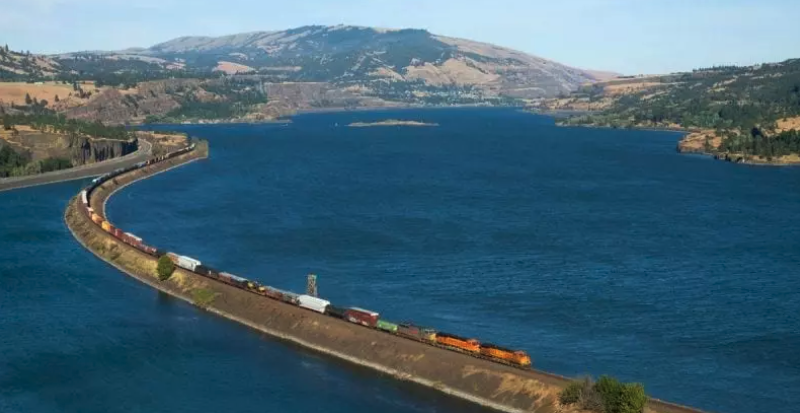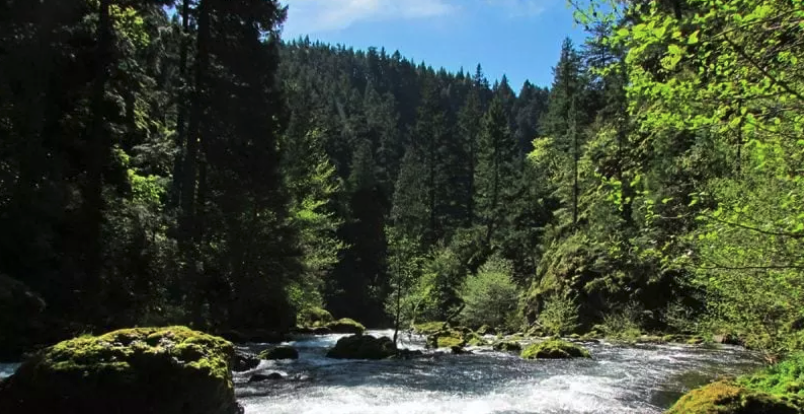SDS Lumber sale: While locals fret, companies evade questions
Reprinted with permission from Columbia Insight :
Lack of information leads to increasing unease as a New York investment firm moves in to handle the sale of a Columbia Gorge logging fixture
By Chuck Thompson and Jim Drake
May 20, 2021 - For 75 years, the SDS Lumber Company headquartered in Bingen, Washington, has been managing 100,000 acres of prime Pacific Northwest forest resources, as well as local lumber mill operations in the heart of the Columbia River Gorge. In September 2020, a press release from SDS announced the company’s shareholders had decided to explore the sale of its timberland holdings and mill properties.
At the time, SDS President Jeff Webber said the company might be sold in its entirety or sold piecemeal to multiple buyers. Its various holdings include trucking, marine and commercial real estate operations.
SDS was founded in Bingen in 1946 by Wally Stevenson, Frank Daubenspeck and Bruce Stevenson. Its mill operations currently employ about 350 people.
News of the potential change of ownership set off alarm bells across the region. Concerns surrounding the sale have largely focused on what the operational character of its new owners might look like. SDS is broadly thought to have been a fair steward not only of the land it logs but of the communities within its scope of operations.
Road and track: This freight train traveling between Lyle and Bingen, Washington, is a reminder that commerce competes with conservation in the Columbia River Gorge. Photo by David Gubler/Creative Commons
For just one example, among many large parcels it owns, SDS holds land adjacent to the White Salmon River, which has been granted Wild and Scenic status and has undergone significant changes due to dam removal in the last decade. Increased logging in the area by a new owner could reverse decades of work by environmentalists to protect the river corridor.
“That press release was just stunning because you just didn’t expect a company that’s so deeply rooted here to do that and it was like something exploding in our faces,” says Pat Arnold, who leads Friends of the White Salmon River, a group based in White Salmon, Washington, that’s been championing watershed resource protection since 1976.
MORE: The secret power of old growth
Arnold says SDS timber management practices exceed those adhered to by other companies.
“I think SDS is pretty unique in this regard. There’s an average timber rotation in the state of Washington of 35 years, but SDS seems to work on a much longer term,” she says. “The vertical integration they have with their mill and the land is unique.”
‘Project Steelhead’
Concerns over the sale have turned to outright paranoia in some circles in recent weeks with the announcement that SDS has engaged New York-based investment banker Perella Weinberg Partners (PWP) to broker its sale.
PWP is calling its campaign to offload SDS assets “Project Steelhead” (unclear if that name is intentionally ironic or simply an East Coast investment firm’s tone-deaf attempt to associate itself with a Columbia Basin icon) and is now floating a brochure to potential investors touting “key investment highlights.” These include a “mature forest inventory with 85% over 50 years old” and “potential for significant harvest” with “immediate mill production increase potential.” Translation: ability to cut down lots of old trees, fast.
“The current 60-year harvest rotation, which translates to 1,700 acres per year, could accelerate to a more frequent 45-year harvest rotation, producing 2,200 acres of harvest per year, an increase of nearly 30%,” wrote The Goldendale Sentinel earlier this month.
“‘Project Steelhead’ indeed,” reads a Friends of the White Salmon River press release that followed circulation of the PWP brochure. “The sales brochure makes it absolutely clear that the outcome will be maximum profits for SDS and for investors, at whatever price the rest of us will pay. Weep with us.”
Short- or long-term profits?
The financial burden of a new company likely taking on debt to acquire SDS is another concern. Arnold believes whoever buys the land will probably have to use a business model that reaches for short-term profits, in order to satisfy shareholders.
Woods product: Pat Arnold of Friends of the White Salmon River. Photo by Jim Drake
“Chances are that somebody’s gonna come in and take the timber to another mill, and shut this one down,” speculates Arnold. “You can’t hardly imagine anybody at all stepping in and continuing what SDS is doing. It’s just probably not even feasible.”
Absent the kind of commitment to long-term timber harvest rotation SDS has operated with, logging practices could have serious negative impacts on wildlife habitat and neighboring lands, and create public roads access issues due to improper tree removal and water-quality degradation in fish-bearing streams due to inadequate buffer zones.
A worst-case scenario, says Arnold, could involve new owners rezoning existing forest parcels into residential lots, something she says would be financially attractive to a company looking to make quick profits.
MORE: Forest Service seeks to eliminate protection on large trees
There is, however, another possibility, raised by The Goldendale Sentinel.
“Unlike prior efforts to sell SDS to major Northwest timber operations, the Perella Weinberg appointment points more toward the creation of a timber investment management operation that will be owned by ‘investor-owners’ who can afford the long-term investment horizons ideal for the timber industry,” wrote the newspaper. Goldendale is the seat of Klickitat County, where Bingen is located.
Film looks at SDS practices
In an effort to inform the public on the sale and SDS’s connection with the communities it serves, Friends of the White Salmon River partnered with Joel Roth, a local high school student whose family is involved with the Friends group. His interest in filmmaking led to discussions about creating an informational video.
That effort resulted in Uprooted, a nine-minute film that explores SDS forest management practices and the potential environmental and economic impacts of its sale.
Featuring interviews with former Washington State Department of Natural Resources employees, as well as an archeologist who worked for the Yakama Nation, the video discusses SDS’s forest management practices, wildlife habitat issues and experiences with saving Native American cultural resources on land scheduled for logging.
Clear and present: Recent clear-cuts, like this one in the White Salmon River drainage, are a part of the scenery around the Columbia River Gorge. Photo by Jurgen Hess
According to the video, today’s landowners are operating more as a financial company than a company focused on long-term environmental stability.
“The SDS press release indicates that there’s a lot of new people on the board of directors, most of which are probably unrelated to Klickitat County, not having any ties to our local area,” says Arnold. “One of them is a business rescue specialist out of Portland.”
According to an October 2020 article published by Forest Economic Advisor, a wood markets news website, those new board members (announced in September) include Sandy McDade, a 34-year Weyerhaeuser executive with extensive experience in international timber markets, and Clyde Hamstreet, “a Portland-based corporate turnaround specialist.”
Many questions, no answers
If Arnold and others are wary of the pending sale, the companies involved aren’t going out of their ways to keep local communities informed of developments.
Wall Street vision: Julian Garratt leads the team handling the SDS sale. Photo Perella Weinberg Partners
Columbia Insight has made multiple attempts to contact SDS, PWP and their affiliated media relations firms to request information or interviews regarding the SDS sale.
In the case of PWP, when a person in the company’s New York business office was eventually reached by phone, she did not identify herself and responded to a request to be put in touch with a PWP spokesperson or media representative by saying, “We can’t give our company information.” She then transferred the call to a non-functioning voicemail box.
Phone calls to PWP offices in Los Angeles and San Francisco (and, sometimes, New York) ring through to Agility, a $10 billion CIO outsourcing unit within PWP that specializes in investment strategies for outside firms such as pension funds and hedge funds.
MORE: In Columbia River Basin, a push to use forestry to fight climate change
On May 19, in response to an email sent to PWP partner Jonathan Prather and Executive Director Julian Garratt (both are listed as contacts on the Project Steelhead sales brochure) inquiring broadly about the SDS sale and Agility’s role in it, Columbia Insight received an email response from Kara Findlay, PWP’s managing director.
Salutations aside, Findlay’s email reads in its entirety: “Thank you for your email. We decline to comment.”
SDS spokesperson Liz Fuller of Portland-based Gard Communications, who handles media inquiries for SDS Lumber, did respond to inquiries from Columbia Insight, though declined to provide updates or substantive information about the sale process.
“The doors are wide open for a completely different kind of timber management,” says Arnold, summing up an increasingly common worry around Columbia River Gorge communities. It’s an enormously complex issue and we are trying our very very best not to turn this into a thing where people are on one side or another.
Counting on corridors: Locals worry an out-of-state buyer won’t share their regard for tree-lined scenes like this one along the Spirit Falls Trail on the Little White Salmon River. Photo by Jeff Hollett/Creative Commons
“The only thing I think people should take a position on is to ask SDS to share more information. SDS said in their press release that they care about the community. They said that, so let’s see it. How can this move in the direction that’s good for all the parties concerned?”
Jim Drake is a freelance writer and media consultant living in Hood River, Oregon. Chuck Thompson is editor of Columbia Insight.







